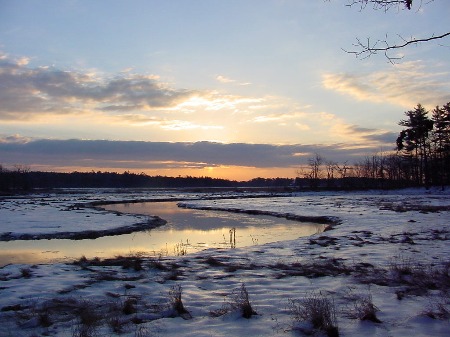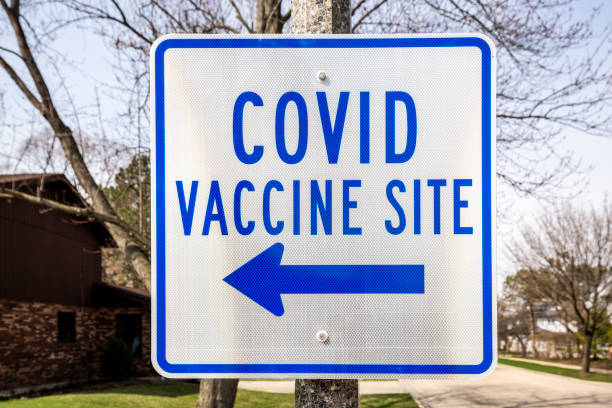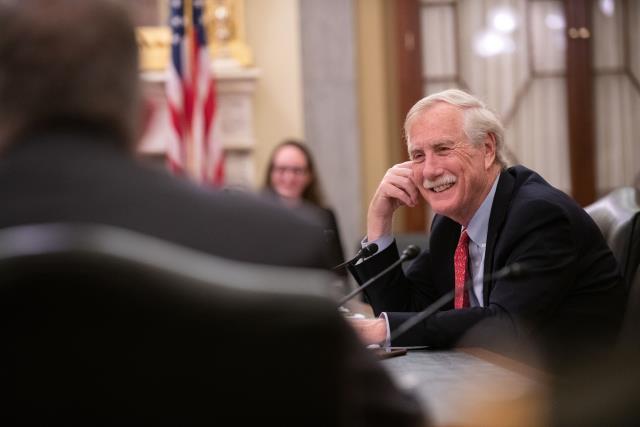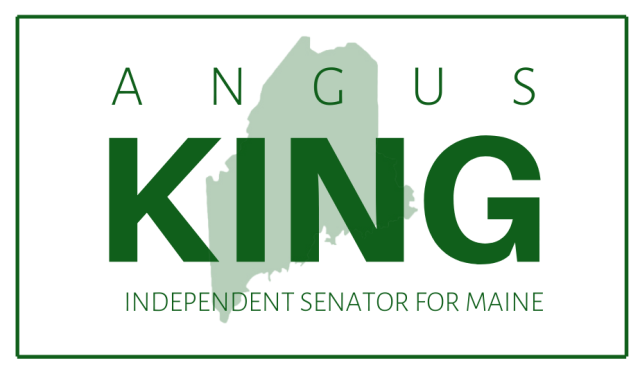Wishing You a Happy and Healthy 2022

Friends and neighbors – on the heels of 2020’s terrifying challenges, 2021 brought us both amazing progress and frustrating setbacks. We saw the incredible rollout of several effective, FDA-approved COVID-19 vaccines that helped reduce the risks of this deadly pandemic – but vaccine hesitancy, combined with the dangers of new variants, have prolonged this crisis and created new risks for Maine people.
The obstacles were extreme – but despite the pitfalls, I’m proud of what Congress was able to deliver for a nation gripped by an unprecedented pandemic. As we reflect back on the year, we see the important action that will make a difference for Maine people in the future, including the American Rescue Plan’s strong response to the pandemic and the Bipartisan Infrastructure Bill’s long-overdue investment in Maine’s roads, bridges, broadband, and more. At the same time, we still see much work unfinished, including passing support for America’s working families, confronting the dangers of climate change, and taking decisive action to defend the foundation of American society: our democracy.
Even still, I am filled with optimism because I know the true nature of our citizens, though challenged, has not changed. Despite every hardship, people in towns and communities have stepped up with strong local leadership, a willingness to help, and a Maine ‘neighborhood’ spirit. It is why I truly believe we can and will get through anything together – and why I’ll never stop fighting to make life better for our state.
As we enter into 2022, Mary and I want to wish you a happy, healthy, and safe New Year – we can’t wait to see you soon.
Strengthening our National Defense and Bolstering Maine Communities

For more than 60 years, the Senate has put aside its differences to pass a bipartisan National Defense Authorization Act (NDAA), which improves America’s national security, supports our servicemembers, and strengthens Maine communities. The bill may not make regular headlines, but it is a massively important piece of legislation that invests in America's future. Earlier this month, Congress reaffirmed the importance of this legislation by passing it through an overwhelmingly bipartisan vote.
The bill makes important investments in the military’s greatest asset – our people – by delivering a well-deserved pay raise of 2.7 percent, in addition to expanding parental leave for the servicemembers who put their lives on the line for our country. We have a responsibility to serve them as they serve us, and this bill lives up to that duty.
The legislation will also support good-paying jobs in Maine communities, particularly through its funding for shipbuilding priorities. The bill included $4.9 billion for the procurement of three DDG-51 Arleigh Burke-class destroyers which Bath Iron Works can compete to build. These funds will help Bath Iron Works plan its future and continue to build the highest-quality ships, sustaining local jobs and ensuring that our Navy has the tools they need to accomplish their missions across the globe.
There are many more important provisions in this legislation – including steps to strengthen research and development initiatives at Maine businesses and universities, support our interests in the Arctic, and improve America’s cybersecurity.
Bottom line: this bill will make our country safer, strengthen our economy, and reward the men and women who serve in our military. I’m grateful that we could get this bill done.
Assessing the Situation in the Middle East

The old saying is that "one day of seeing is better than one-hundred days of reading" – which is why earlier this month, I skipped my usual flight home to Maine and instead led a bipartisan Congressional Delegation with three of my Senate colleagues to visit Pakistan and Qatar. Together, we worked to learn more about where things stood in the region four months after America’s withdrawal from Afghanistan, and about opportunities for strategic cooperation.
In Pakistan, we met with the country's leadership to discuss our mutual interest in preventing a renewed rise of terrorism from taking root in Afghanistan. We also sought solutions for the looming humanitarian crisis in Afghanistan as the country faces a winter with serious shortages of food and water.
One of the other purposes of the trip was to thank the Qataris for their incredible help during the evacuation from Afghanistan. They helped us handle the thousands of evacuees (over 50,000 in their case) while we vetted their backgrounds, checked medical status, and arranged for permanent settlement there or elsewhere. Now, thanks to their partnership, and the hard work of the American servicemembers who facilitated the evacuations, almost every single American who wants to leave Afghanistan has been able to exit the country.
All told, we travelled almost twenty thousand miles across eight time zones in four days and met with the top leadership in both countries as well as the amazing American military and embassy staff we have serving us on difficult assignments. I could not be more grateful to everyone who helped make the trip possible, who took the time to meet with us, and for Senators Richard Burr (R-NC), John Cornyn (R-TX), and Ben Sasse (R-NE) for joining me.
After the trip, I sat down with MSNBC's Andrea Mitchell to share more about what we learned, you can watch the interview here or read more about the trip here in a piece by Spectrum Maine.
Reflecting on the Progress of the Cyberspace Solarium Commission
.jpg)
Throughout 2021, we’ve seen example after example illustrating the United States’ unacceptable vulnerability to cyberattacks. Critical pieces of our infrastructure and society have been compromised, from gas pipelines and supply chains to businesses and government online operations. As one of the world’s most digitally-connected countries, a successful cyberattack on the U.S. could cripple important networks in a way that significantly impacts our everyday lives – and possibly cost lives.
This is precisely why Congress created the Cyberspace Solarium Commission (CSC) in 2019, to rethink our national security posture for the digital age. The CSC – a group of bipartisan Congressional leaders, top executive branch officials, and experts from the private sector met several times a month to scrutinize and stress test America’s vulnerabilities in cyberspace while seeking solutions to shore up our defenses. I’ve been honored to co-chair this group alongside Congressman Mike Gallagher (R-Wisc.) – and I’m immensely proud of the work we’ve done.
As the CSC wraps up its scheduled work this month, we can point to a lot of progress made. While many commissions produce robust reports, we’re proud to say we’ve produced results. More than three dozen CSC recommendations have been enacted into law. These provisions include the creation of a new, Senate-confirmed National Cyber Director to coordinate the federal government’s efforts, important federal investments in national cyberdefenses, a new mindset for network resiliency, and the creation of contingencies to minimize the effect of a major disruption.
So, after years of work, some fifty meetings, and a significant impact on the country’s cybersecurity posture, the CSC will wind down its efforts at the end of the year – but we will not be walking away from this fight. Much work still remains, and we will continue working to implement more of the Commission's recommendations. In an op-ed for the Washington Post, I discussed the successes of the CSC, and laid our next steps for America's cyberdefense – you can read it here.
Giving the Great Outdoors a Helping Hand

Each year, millions of visitors from around the globe come to Maine to experience our picturesque coastline, lush forests, awe-inspiring mountains, and a taste of the Way Life Should Be. But while Maine’s natural beauty is unmatched, and the outdoor recreation opportunities are unrivaled – our outdoor industry has not been immune from the impacts of COVID-19. With the pandemic preventing many Americans from traveling, Maine businesses that rely on tourism have been put at risk, and in 2020, our state lost 24% of our jobs in outdoor recreation.
In order to protect these businesses, and help our outdoor economy grow back stronger than ever, we need to make our outdoors accessible and available to more Americans. On the Senate Subcommittee on National Parks, we've been working to do just that.
I have been working on two pieces of legislation recently that I believe will be especially helpful in supporting our outdoor economy and extending new opportunities to people of all backgrounds. First, the Simplifying Outdoor Access for Recreation (SOAR) Act will streamline the permitting process for outfitters, educational organizations, and community groups to access public lands. This will make it easier for outdoor groups to take hikers to a new park, or for a rafting company to access a new river. It also reduces permit fees and costs for small organizations like those across Maine. Second, the Outdoors for All Act will require the National Parks Service to award grants for projects in communities without adequate park access and to prioritize projects that support underserved communities. This will help more Americans access parks so they can connect with the natural world around us, in addition to supporting more outdoor businesses.
All told, this legislation will cut red tape and better direct federal resources in order to help our outdoor recreation industry bounce back from the COVID-19 pandemic stronger than ever.
Protect Yourself and Your Loved Ones

Roughly twenty months into the pandemic, COVID-19 is as great a threat to Maine people as it has ever been. The Omicron variant is driving record highs in both new cases and hospitalizations, taking lives and putting our state’s most vulnerable citizens in jeopardy – and on the heels of the holidays, I fear the risks will become even greater. This dangerous surge is stretching the capacity of Maine’s hospitals and healthcare providers and threatening to affect vital care for Mainers who have non-COVID related needs. We can’t keep traveling down this path – with cold weather setting in, it is absolutely critical that Maine people take steps to protect themselves and reduce the danger of spreading the virus.
The most effective way to reduce your risk is simple: get vaccinated. It is clear at this point that we are fighting two different wars against this virus – one by those who have been vaccinated and have resiliency, and one by those who have yet to get this proven protection and are at far greater risk. Hospitals across Maine are reporting that the overwhelming majority of hospitalized COVID-19 patients are unvaccinated – and unvaccinated people make up an even larger share of patients in ICUs and on ventilators. Getting your vaccine – and, when possible, your booster – is the most effective way to prevent a potentially life-threatening case of COVID-19.
I also urge Maine people to continue to wear masks while indoors and in close proximity to others, whether they are vaccinated or not. We all want to take off the masks, but it’s a small sacrifice to keep yourself and your loved ones safe.
I know that many of us want to be done with the pandemic – but it is clear that the pandemic is not done with us. COVID-19 is as dangerous to Maine people as ever, and it’s time to take the safe, proven, commonsense steps that will protect ourselves, our loved ones, and our communities.
December Policy Update

As a reminder, you can read more on my regularly updated press release page at king.senate.gov. Here are some other priorities I’ve been working on:
- Investing in roads and bridges. Thanks to the Bipartisan Infrastructure Bill, Maine will be receiving $244,550,089 to maintain and reconstruct roads, highways, and bridges across the state. These funds will make a major difference for Maine people, bolster our state’s economy by creating good-paying jobs, and help create a more resilient infrastructure for decades to come. Read more HERE.
- Confirming a federal broadband leader. With an overwhelmingly bipartisan vote, the Senate re-confirmed Jessica Rosenworcel for a third term on the Federal Communications Commission (FCC). I have worked closely with Jessica to expand affordable, high-speed broadband connections to more people throughout the country and on efforts to close the “homework gap” – and I know there is no one better for the job. Read more HERE.
- Combatting ALS and expanding research. The Accelerating Access to Critical Therapies (ACT) for ALS Act, passed the Senate and was signed into law by President Biden. The bipartisan legislation will fund essential research into fast-progressing, rare neurodegenerative and terminal diseases, like amyotrophic lateral sclerosis (ALS), and promote early access to promising investigational therapies for patients. Read more HERE.
- Improving water infrastructure. Thanks to the Bipartisan Infrastructure Bill, Maine will receive $68,390,000 to upgrade water infrastructure. These funds will combat contaminants such as PFAS, and help ensure Maine’s water systems are supporting the long-term health of our people. Read more HERE.
In The News

Thanks for subscribing to my monthly newsletter! I would love to hear your ideas for how we can make Maine and our country a better place. Please feel free to reach out with any questions, comments, or concerns by visiting: https://www.king.senate.gov/contact —we look forward to hearing from you.
***PLEASE NOTE***
Due to the impacts of COVID-19, my staff in Washington, D.C. are working remotely – but we’re still at work, ready to help you navigate any challenges you’re facing during this challenging time.
All the best, and stay healthy!

To unsubscribe to this e-Newsletter click HERE.
|